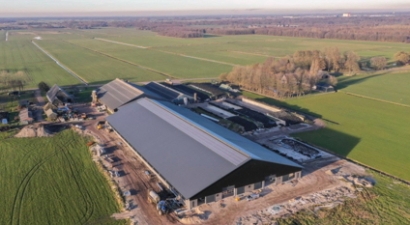
Thanks to the Microferm, renewable gas can be produced from the manure of the 550 dairy cows at the farm of dairy farmer Van der Wal. This is done by means of anaerobic digestion: a controlled fermentation process in a gastight tank. The biogas produced is upgraded in a biogas upgrading system to biomethane which then is directly fed into the natural gas network. The micro-digester produces sufficient sustainable gas to supply as many as 980 households for their gas needs. That is 1.5 times the number of households in Boornbergum.
“This project is a nice continuation of the first series of our Microferm projects in collaboration FrieslandCampina within the Jumpstart initiative. This way we contribute to an increasingly sustainable Dutch agricultural sector,” says sales manager biogas Sjaak Klein Gunnewiek.
The new barn of dairy farm Van der Wal was put into use in 2019. When the new barn was designed, the realization of a manure digester was taken into account. The dense, low-emission stable floor, with a manure scraper and deposit basements on both sides of the stable, instead of a manure pit below the stable, makes for an ideal configuration for manure digestion. The fresh manure is pumped into the digester every day, ensuring that as little gas potential as possible is lost. The combination of manure digestion and the low-emission barn reduces ammonia and methane emissions.
Manure is a valuable product. HoSt’s mission is to get as much energy as possible from this valuable product in the most sustainable way possible. Within the Jumpstart initiative of FrieslandCampina, HoSt is the only qualified supplier of the manure digester including a biogas upgrading system: the Microferm. Digesting proprietary manure and producing renewable gas with the Microferm offers the possibility of generating up to 50% extra income on the dairy farm while reducing emissions from the farm to almost nil, producing bio-fertilizers and manure with less nitrogen.

